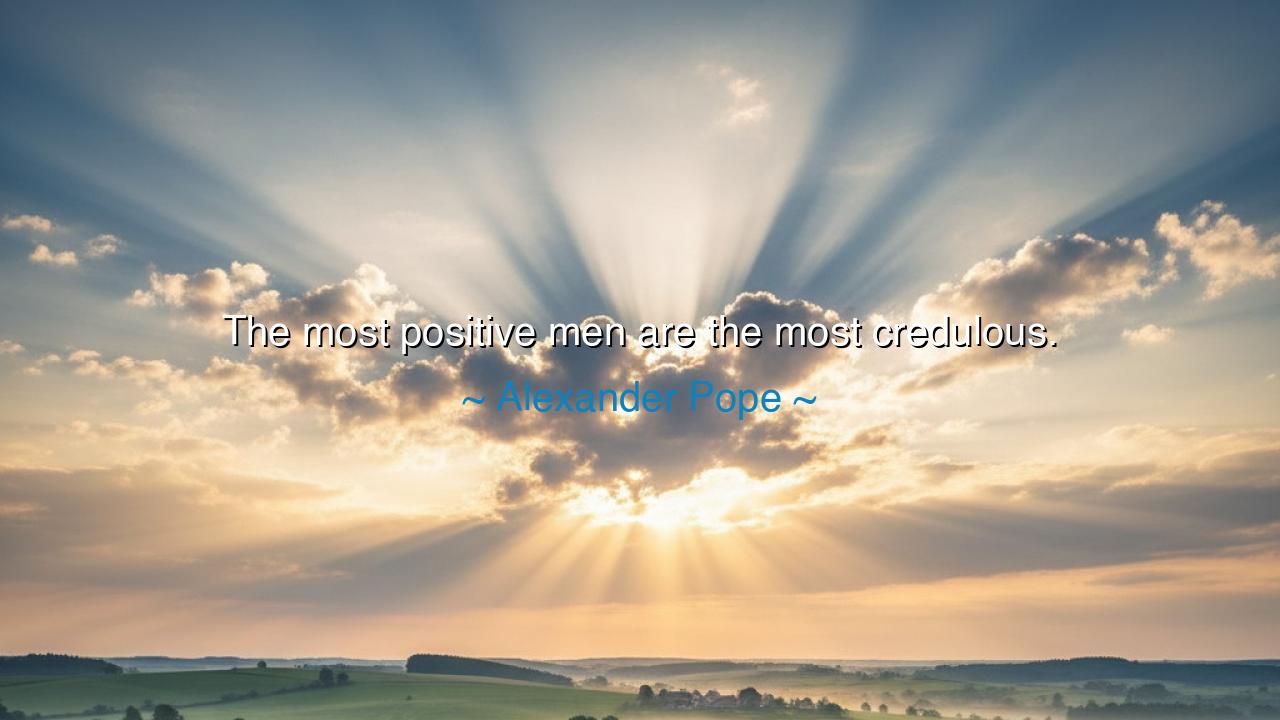
The most positive men are the most credulous.






"The most positive men are the most credulous." These words, spoken by the insightful Alexander Pope, challenge us to consider the delicate balance between optimism and naivety. Pope, ever the keen observer of human nature, recognized a subtle yet significant truth: those who are most eager to see the good in the world, to remain hopeful and confident in all things, may also be the most vulnerable to believing things that are not grounded in truth. In their search for positivity, they often overlook the complexities and the realities that lie beneath the surface, thus becoming susceptible to being misled by those who prey on their credulity.
The ancient philosophers understood well the dangers of excessive optimism. Plato, in his writings, often cautioned about the need for wisdom and knowledge before one could act with genuine virtue. The idealism of a philosopher who does not also understand the human condition is, as Plato taught, a dangerous thing. A man may seek the good, but without wisdom, he is like a sailor who steers his ship by the stars without understanding the currents or winds that might throw him off course. In this way, Plato and other great thinkers knew that to be truly positive—to expect the best in the world—required not just hope, but the realization that the world is complex and that not all men are driven by good intentions.
Pope's wisdom is a reflection of this ancient understanding. A positive man—one who is always eager to see the good and who holds an unwavering belief in the potential of others—may do so from a place of deep optimism and goodwill. However, Pope's words serve as a cautionary tale: credulity, when unchecked, can lead to disappointment and exploitation. It is through hope that many of us strive for a better future, but it is in the shadows of hope that the less noble can take advantage of the gullible and those who are unwilling to confront the darker realities of the world. Pope’s critique suggests that positivity, when taken too far, can blind one to dangerous truths.
History provides us with many examples of men and women whose optimism was their downfall. Take, for example, the Tulip Mania in the 17th century, one of the first recorded economic bubbles. During this time in the Netherlands, the belief that the value of tulip bulbs would continue to rise led many to invest everything they had in these flowers. The optimism of the market participants made them credulous, blind to the inherent instability of such speculative investments. When the bubble burst, it resulted in widespread financial ruin. The investors, most of whom had been driven by a sense of hope for continued prosperity, found themselves devastated by the collapse of what had seemed like an undeniable certainty. In this case, credulity rooted in unchecked optimism led to personal and financial ruin.
The lesson of Pope’s quote can also be seen in the tale of Nero, the Roman Emperor whose reign began with great promise but ended in devastation. Nero was once seen as a ruler who would bring prosperity and fairness to the empire, and early in his reign, he enjoyed widespread support and optimism. However, his credulous belief in his own greatness and his naivety about the consequences of his actions eventually led to his downfall. Nero’s self-confidence, combined with his refusal to listen to wise counsel, made him susceptible to the whims of flatterers and the miscalculations of his own misguided plans. Like those in Tulip Mania, Nero's overabundance of positivity led him down a path of ruin, and his reign became a symbol of how unchecked optimism can lead to disastrous outcomes.
Pope’s insight, then, is a call to be both positive and wise—to balance hope with caution and to temper optimism with a healthy dose of realism. True wisdom lies not in blindly believing in the best outcome, but in understanding that the world is filled with both light and shadow. A truly positive person can see the good while also acknowledging the difficulties and imperfections in life. This kind of grounded optimism does not shy away from the challenges of the world but faces them with a clear-eyed understanding of their potential to affect one’s journey.
The practical lesson for all of us is to recognize that hope should not be a substitute for knowledge and awareness. As you strive to maintain a positive outlook, remember that true strength comes from understanding the realities around you. Do not be too credulous—do not allow your desire for things to be good to cloud your judgment or cause you to overlook the signs of danger. In your daily life, balance hope with caution, and embrace wisdom. In this way, you will not only remain optimistic, but you will also be prepared to face the inevitable challenges that will arise with the strength and clarity of a truly wise soul. The world may be full of darkness, but with realistic optimism, you can find your way through it and inspire others to do the same.






AAdministratorAdministrator
Welcome, honored guests. Please leave a comment, we will respond soon